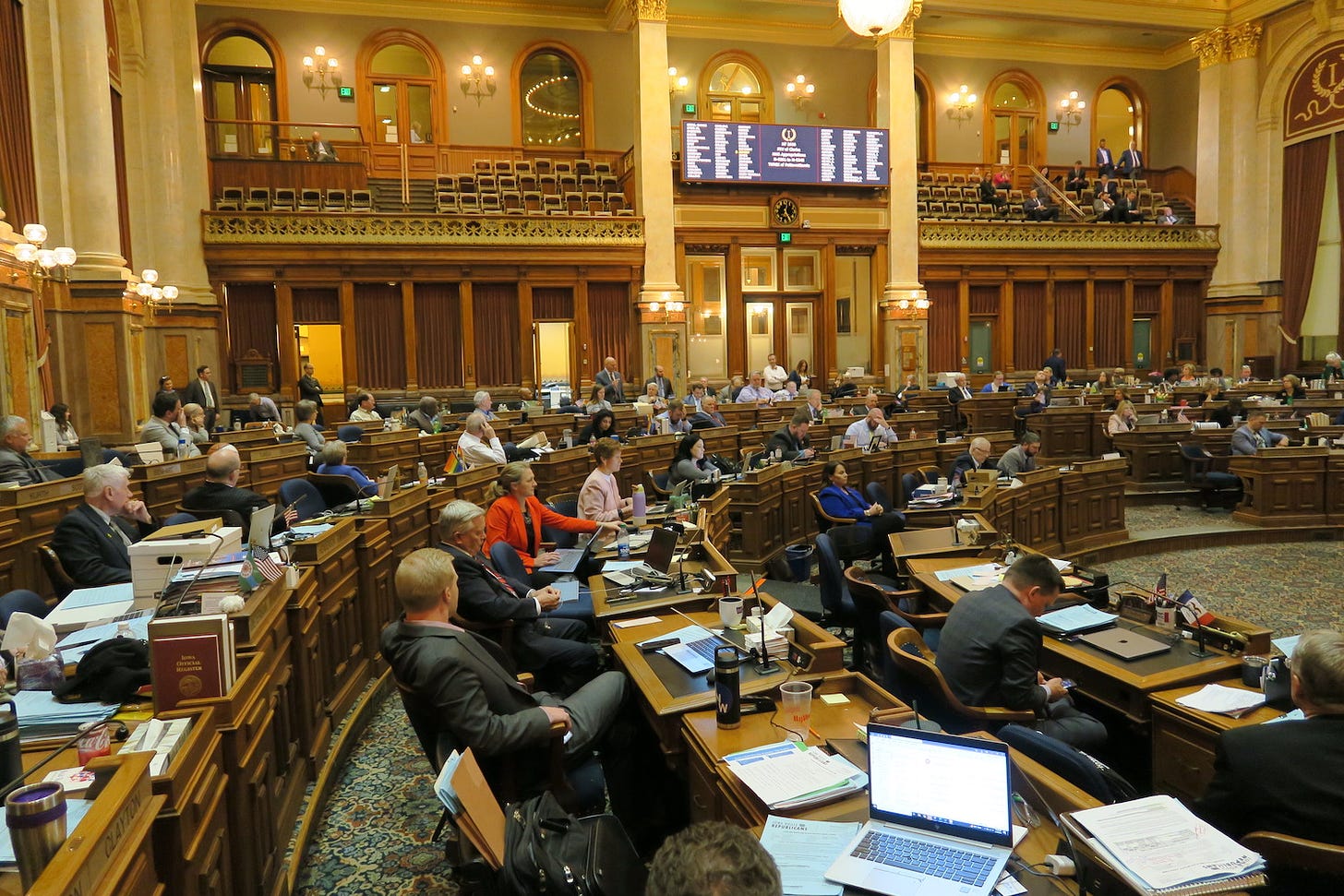Farewell to the Iowa legislature's 2024 session—and to Dennis Hart
April 22 "Capitol Week" is online
I’ve followed lots of late-night legislative debates from home, but thanks to the Institute for Free Speech, I was able to cover this year’s sprint to the finish from the Iowa House press bench. I was there when the House adjourned for the night at 1:46 am on April 19, and there when the legislature adjourned for the year at 4:23 am on April 20.
Although I don’t think spending more time in the chamber changed my approach to covering legislative happenings, it was genuinely helpful to have a different perspective, and much easier to get questions answered. I have many posts in progress about bills that passed and fell by the wayside.
For now, I want to focus on another milestone. Dennis Hart and I recorded the 170th edition of “KHOI’s Capitol Week” on April 22, and this show was our last as a team. Dennis will stay involved with KHOI, reading the statewide news for “Local Talk” on Monday mornings and occasionally co-hosting that program. I will continue to bring listeners the week in Iowa politics on Mondays at 7:00 pm, with rebroadcasts on Tuesdays at 6:00 am and Wednesdays at noon.
If you know someone who would appreciate a 30-minute program about Iowa politics, please help us spread the word. “KHOI’s Capitol Week” is available on all podcasting platforms, and I will continue to share every episode here as well. The full archive is available on KHOI’s website.
On to our April 22 program:
Obviously, Dennis and I spent most of the episode talking about the legislature’s work.
House and Senate Republicans reached a final agreement on speeding up the transition to a flat income tax, and lowered the flat tax rate from 3.9 percent (the level approved in 2022) to 3.8 percent. The so-called “tax omnibus” bill (Senate File 2442) also makes some changes to property taxes;
Ten House Democrats and seven Senate Democrats joined all Republicans present to vote for the latest tax cut bill (here’s the House roll call and the Senate roll call);
Voting along party lines, House and Senate Republicans gave final approval to a pair of proposed state constitutional amendments. Senate Joint Resolution 2004 would require the state to have a flat income tax rate for all individuals, and House Joint Resolution 2006 would require a two-thirds vote in the legislature to raise individual or corporate income taxes. (Raising the sales tax could be done by a simple majority vote, like all other bills.) If both chambers pass these constitutional amendments again in 2025 or 2026, they will appear on a statewide ballot, and voters will decide whether to add the language to the constitution;
Before adjourning, lawmakers had to approve a budget for the fiscal year that begins July 1. The last bill didn’t appear until after midnight on April 20, hours before legislators wrapped up their work. Total spending in FY2025 is expected to be approximately $8.9 million;
House Republicans mostly capitulated to the Senate and Governor Kim Reynolds on the final version of Senate File 2385, which eliminates dozens of state boards and commissions and consolidates more power in the governor’s appointees. The House debate was emotionally charged, and the most contentious provisions will strip most of the Iowa Civil Rights Commission’s authority and will scrap commissions focused on specific marginalized communities (African Americans, Latinos, Native Americans, Asian and Pacific Islanders, and more);
Continuing the GOP trifecta’s determination to take powers away from local governments, the Senate approved House File 2319, which bans guaranteed income programs. I’m old enough to remember when Iowa Republicans claimed to stand for “local control”;
Large bipartisan majorities in both chambers approved House File 2673, the governor’s proposal to restructure Iowa’s mental health and behavioral health services;
In contrast, House File 2652 passed on mostly party-line votes. That bill “includes new requirements for building safety standards and allows schools to use professional development funds to pay for training for armed staff members”;
Another bipartisan bill, House File 2615, changes the formula for state aid to community colleges;
We only had time to cover a few of the more than 40 bills Governor Reynolds signed last week. There was unexpected high drama surrounding Senate File 2431, which lifts the statute of limitations for Iowans who were victims of sexual abuse as Boy Scouts decades ago;
Another bill signed Friday was House File 2586, which (Republicans hope) will make it easier for school districts to authorize staff to carry firearms without losing insurance coverage. One of the most controversial provisions would give schools and staff qualified immunity from criminal prosecution and civil liability if the “reasonable” use of a firearm at school injured or killed someone. My question is: would they have immunity if negligent handling of a firearm at school caused a tragedy? I would welcome insight from attorneys;
Dennis and I spent several minutes reviewing some of the major bills that passed this year. Of course we began with the overhaul of the Area Education Agencies, which sucked up most of the oxygen until late March;
House and Senate Republicans each killed one of the other chamber’s immigration bills in March. But they agreed on Senate File 2340, which creates the new state crime of “illegal reentry.” It’s modeled on an almost certainly unconstitutional Texas law;
We haven’t begun to see the consequences of Senate File 2095, the so-called Religious Freedom Restoration Act (known to detractors as the right-to-discriminate bill). Both chambers approved this on party-line votes;
Senate File 2096 repealed Iowa’s landmark law requiring gender balance on state boards and commissions. It will be interesting to see how many boards remain gender-balanced in the coming years;
Most of the governor’s proposed bills did become law. Senate File 2204 contains new regulations on foreign farmland ownership. House File 2618 requires teachers to be trained in certain literacy instruction. Senate File 2252 relates to the so-called “MOMS” program, which will funnel state money to crisis pregnancy centers;
Moving to bills that failed to reach the governor’s desk, Dennis and I only had time to cover a few. Despite heavy lobbying from the Bayer corporation and some agricultural groups, the House did not pass Senate File 2412, which would give pesticide manufacturers immunity from lawsuits;
I don’t know why Iowa Senate leaders didn’t bring the “Baby Olivia” video bill (House File 2617) to the floor. Anti-abortion groups lobbied for that legislation, which would have required schools to show students videos about fetal development;
One part of Reynolds’ agenda that didn’t get through was her effort to define “man,” “woman,” and other terms in Iowa Code in a way that would exclude transgender people, and require driver’s licenses and birth certificates to list the person’s sex assigned at birth. On the last day of the session, a House Republican tried to attach an amendment with similar birth certificate language to another bill, but he withdrew that amendment without putting it to a vote;
As usual, the Senate did not take up the latest House bill seeking to address eminent domain for CO2 pipelines (House File 2664);
With only a few days left in the session, House Republicans tried to raise legislative salaries by $10,000, effective in 2025. I support the idea, but House File 2700 appeared way too late this year;
House and Senate Republicans failed to agree on a proposal to allocate tens of millions of dollars Iowa received through a multi-state lawsuit against opioid manufacturers. I am working on a Bleeding Heartland post about this inexcusable failure to use money we could be spending to address a public health crisis;
A new experience for me: I was able to observe a conference committee meeting. Republicans had not taken that step since the party gained the trifecta in 2017, but last week, they went to conference over Senate File 2109, dealing with driving privileges for 14- and 15-year-olds. Lawmakers in each chamber claimed victory after the House and Senate approved the conference report;
One bit of non-legislative news: five more major publishers joined the lawsuit challenging Iowa’s school book ban, part of an education law Republicans approved in 2023. A federal court enjoined that provision in December, but the state’s appeal is pending before the Eighth Circuit.
Dennis and I spent the last five minutes or so reflecting on our work together since KHOI launched “Capitol Week” in February 2021. We’ve recorded all but one of our 170 programs over Zoom, usually with Dennis in California and me at home in Windsor Heights. But we did meet in person last June to do one show from KHOI’s studio in Ames:
Dennis has recorded lots of shows on the road. He logged in several times from Disneyworld and hosted at least one program from Montana, Texas, Wyoming, South Dakota, Oregon, and Oklahoma. I’ve done the show three times from my car (twice while I was at the Okoboji Writers’ Retreat), and once from a hospital bed, two days after I destroyed my ankle in January 2022.
I have learned so much from Dennis and will miss working with him immensely. In fact, I’m already scheming to recruit him for a special edition of “Capitol Week” closer to the election. Thank you to all who have listened these past three years.
Randy Evans is the newest member of the Iowa Writers’ Collaborative. (I’ve been publishing his essays at Bleeding Heartland for years.)







Thank you for all of your good work, Laura.